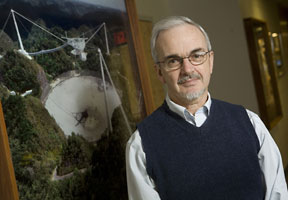Planetary scientist Don Campbell named director of Cornell center that manages NSF's Arecibo Observatory
By Blaine Friedlander

Donald B. Campbell has been appointed director of Cornell's National Astronomy and Ionosphere Center (NAIC), which manages the Arecibo Observatory in Puerto Rico on behalf of the National Science Foundation (NSF). He assumes the position June 1.
Campbell, a native of Australia, succeeds Robert Brown, who has served as director since 2003. Brown will remain on the NAIC staff as director emeritus and as special adviser to the director through the summer.
A planetary scientist with strong, decades-long ties to Arecibo, Campbell takes the reins as the observatory -- the world's largest single-dish radio telescope and most powerful planetary radar facility -- faces a tightening NSF budget and an uncertain future. But Campbell's appointment gives the Arecibo and Cornell communities good cause for optimism, said Robert Buhrman, Cornell senior vice provost for research.
Before joining Cornell as a professor of astronomy in 1987, Campbell was on the NAIC research staff at Arecibo for more than 15 years. He served as director of the Arecibo Observatory (1981-87), interim director of NAIC (1992-93) and as associate NAIC director (1993-2004).
"Don's long affiliation with NAIC and the Arecibo Observatory and his familiarity with its scientific mission and its community, staff, users and supporters make him uniquely positioned to assume the directorship at this critical time," Buhrman said. "There is no one more committed to ensuring the future of the observatory."
Buhrman added that Campbell is particularly well suited to present the NAIC's vision for the future to the 2010 Astronomy and Astrophysics Decadal Survey, to be convened later this year.
Campbell's research makes extensive use of the Arecibo radar systems to study the radio-wavelength-scattering properties of planets, planetary satellites and small bodies. Working with Cornell graduate students, he has recently examined the moon's polar regions for evidence of ice deposits, and used the polarization properties of reflected radar signals to investigate deposits on the surface of Venus and to look for regoliths (rocky material) on near-Earth asteroids.
Campbell is also largely responsible for Arecibo's continuing development as the world's most powerful facility for radar exploration of solar system bodies, including the moon, planets and their satellites and rings, and asteroids and comets. A former vice president of the American Astronomical Society, he earned his B.Sc. (physics) and his M.Sc. (physics -- radio astronomy) from the University of Sydney and his doctorate in astronomy from Cornell.
Highlighting Arecibo's capabilities, Campbell testified before Congress last November on the importance of the telescope's radar system in identifying and tracking potentially hazardous near-Earth objects (NEOs).
"The more we know about [NEOs] in general and about specific ones that pose a threat to Earth, the easier it will be to design effective mitigation strategies," he testified. "Near-Earth objects form a very diverse population encompassing a large range of sizes, shapes, rotation states, densities, internal structure and binary nature."
Campbell spoke this week about his close ties with the Arecibo community.
"I have spent a great deal of time both working at the observatory and living in Puerto Rico, and the observatory and all of its staff are extremely important to me," he said. "I will work with everyone who has an interest in the observatory's future to resolve the current funding issues so that the observatory's staff can concentrate full time on our research and educational missions.
"And let me emphasize, the observatory is still a forefront facility for astronomy and atmospheric research. It's still the world's largest single-dish radio telescope and the most versatile radio observatory in the world," he said.
The current and future research at the observatory ranges from the investigation of pulsars and the study of gravity to the evolution and distribution of galaxies in the universe, he noted -- not to mention the continuing study of the terrestrial planets, NEOs, the Earth's upper atmosphere and space weather.
"I am optimistic that we will resolve [the current funding] issues and that the Arecibo Observatory will continue to be a major contributor to research in the areas of astronomy and atmospheric sciences," he said.
Media Contact
Get Cornell news delivered right to your inbox.
Subscribe